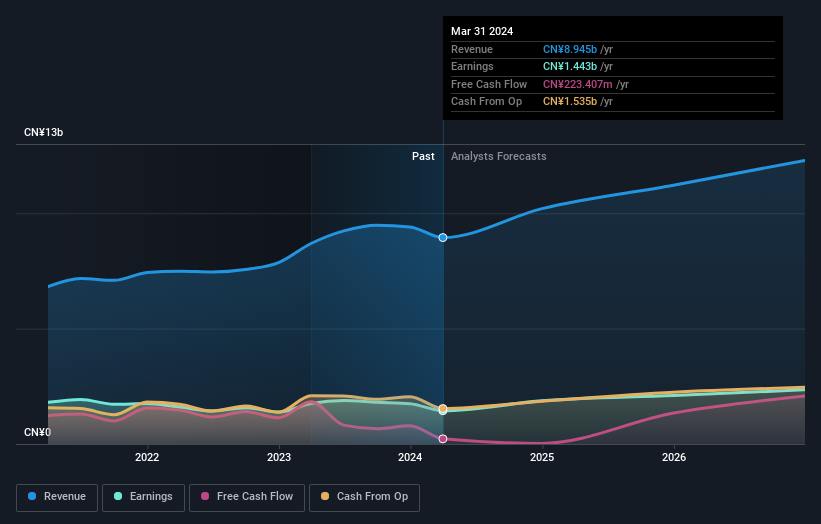- China
- /
- Personal Products
- /
- SZSE:300146
With a 45% stake, Byhealth Co., Ltd (SZSE:300146) insiders have a lot riding on the company

Key Insights
- Insiders appear to have a vested interest in Byhealth's growth, as seen by their sizeable ownership
- 50% of the business is held by the top 8 shareholders
- Institutional ownership in Byhealth is 12%
A look at the shareholders of Byhealth Co., Ltd (SZSE:300146) can tell us which group is most powerful. And the group that holds the biggest piece of the pie are individual insiders with 45% ownership. Put another way, the group faces the maximum upside potential (or downside risk).
With such a notable stake in the company, insiders would be highly incentivised to make value accretive decisions.
Let's take a closer look to see what the different types of shareholders can tell us about Byhealth.
See our latest analysis for Byhealth

What Does The Institutional Ownership Tell Us About Byhealth?
Institutional investors commonly compare their own returns to the returns of a commonly followed index. So they generally do consider buying larger companies that are included in the relevant benchmark index.
Byhealth already has institutions on the share registry. Indeed, they own a respectable stake in the company. This implies the analysts working for those institutions have looked at the stock and they like it. But just like anyone else, they could be wrong. When multiple institutions own a stock, there's always a risk that they are in a 'crowded trade'. When such a trade goes wrong, multiple parties may compete to sell stock fast. This risk is higher in a company without a history of growth. You can see Byhealth's historic earnings and revenue below, but keep in mind there's always more to the story.

Hedge funds don't have many shares in Byhealth. Yunchao Liang is currently the company's largest shareholder with 42% of shares outstanding. For context, the second largest shareholder holds about 2.0% of the shares outstanding, followed by an ownership of 1.2% by the third-largest shareholder.
We also observed that the top 8 shareholders account for more than half of the share register, with a few smaller shareholders to balance the interests of the larger ones to a certain extent.
Researching institutional ownership is a good way to gauge and filter a stock's expected performance. The same can be achieved by studying analyst sentiments. There are plenty of analysts covering the stock, so it might be worth seeing what they are forecasting, too.
Insider Ownership Of Byhealth
While the precise definition of an insider can be subjective, almost everyone considers board members to be insiders. Management ultimately answers to the board. However, it is not uncommon for managers to be executive board members, especially if they are a founder or the CEO.
Insider ownership is positive when it signals leadership are thinking like the true owners of the company. However, high insider ownership can also give immense power to a small group within the company. This can be negative in some circumstances.
Our most recent data indicates that insiders own a reasonable proportion of Byhealth Co., Ltd. It has a market capitalization of just CN¥23b, and insiders have CN¥10b worth of shares in their own names. That's quite significant. It is good to see this level of investment. You can check here to see if those insiders have been buying recently.
General Public Ownership
With a 42% ownership, the general public, mostly comprising of individual investors, have some degree of sway over Byhealth. While this group can't necessarily call the shots, it can certainly have a real influence on how the company is run.
Next Steps:
It's always worth thinking about the different groups who own shares in a company. But to understand Byhealth better, we need to consider many other factors. Consider risks, for instance. Every company has them, and we've spotted 1 warning sign for Byhealth you should know about.
If you would prefer discover what analysts are predicting in terms of future growth, do not miss this free report on analyst forecasts.
NB: Figures in this article are calculated using data from the last twelve months, which refer to the 12-month period ending on the last date of the month the financial statement is dated. This may not be consistent with full year annual report figures.
Valuation is complex, but we're here to simplify it.
Discover if Byhealth might be undervalued or overvalued with our detailed analysis, featuring fair value estimates, potential risks, dividends, insider trades, and its financial condition.
Access Free AnalysisHave feedback on this article? Concerned about the content? Get in touch with us directly. Alternatively, email editorial-team (at) simplywallst.com.
This article by Simply Wall St is general in nature. We provide commentary based on historical data and analyst forecasts only using an unbiased methodology and our articles are not intended to be financial advice. It does not constitute a recommendation to buy or sell any stock, and does not take account of your objectives, or your financial situation. We aim to bring you long-term focused analysis driven by fundamental data. Note that our analysis may not factor in the latest price-sensitive company announcements or qualitative material. Simply Wall St has no position in any stocks mentioned.
Have feedback on this article? Concerned about the content? Get in touch with us directly. Alternatively, email editorial-team@simplywallst.com
About SZSE:300146
Flawless balance sheet and undervalued.

